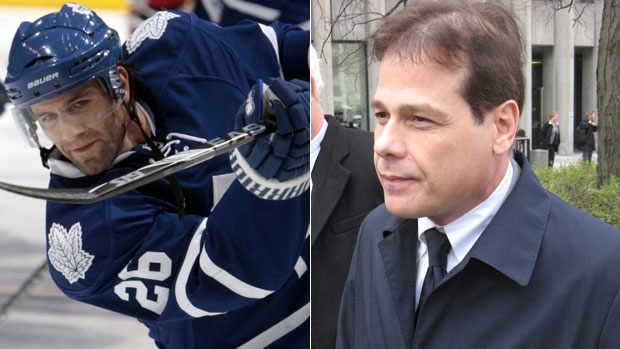Nov 17, 2016
Former Leaf player, fired for morals clause, wins lawsuit
Mike Zigomanis wins case against Frank D’Angelo over energy drink endorsement deal.

A one-time Toronto Maple Leafs player who lied about photos of his genitals being posted on the Internet has won a court judgment against a Toronto entrepreneur who cancelled the player’s $200,000 endorsement contract, citing a morals clause that allegedly kicked in when the photos surfaced.
Frank D’Angelo, the founder of D’Angelo Brands and Steelback Brewery, has been ordered to pay former NHL player Mike Zigomanis $162,500, plus interest, according to a judgment released Monday by Ontario Superior Court Judge David Stinson.
Zigomanis, who last played professional hockey in 2013-14 with the Rochester Americans, successfully argued that he had been wrongfully terminated from a contract with D’Angelo’s Cheetah Power Surge energy drink brand. Stinson wrote that the morals clause was not retroactive, and that Zigomanis had shared the photos with his then-girlfriend before signing the endorsement deal.
Lawyers for D'Angelo and Zigomanis did not reply to emails seeking comment.
During the 2010-11 season, Zigomanis played eight games with the Maple Leafs before being demoted to the Marlies. In May 2011, he met D’Angelo after appearing on the entrepreneur’s TV show and agreed to appear in a TV commercial promoting Cheetah.
Under terms of his contract, Zigomanis agreed that he would participate in one production session and two personal appearances each year. He also agreed to sign 50 autographs to be used for D’Angelo’s promotion or for charity.
Zigomanis was to be paid $50,000 per year, paid quarterly. After two years, he had the option to extend his endorsement contract two additional years.
The contract included a termination clause that allowed D’Angelo to cancel it if the Zigomanis committed, “any act which shocks, insults, or offends the community, or which has the effect of ridiculing public morals and decency.”
In December 2011, that morals clause took on added importance.
Zigomanis became ensnared in a controversy after The Toronto Star reported photos of his genitals had allegedly been posted on a U.S.-based website where jilted lovers post nude, often lewd, pictures of their exes.
Zigomanis denied he was pictured in those photos.
“Sadly this is one of the few downfalls of being a pro athlete,” former Marlies coach Dallas Eakins wrote on Twitter at the time. “False statements, pictures are common. Attempted identify thefts are picking up.”
"Ziggy assures us that the clothed photos are of him, and were purloined off his Facebook account," former Leafs general manager Brian Burke told The Toronto Sun. "He also assures us that the nude photos are not of him. He has retained a lawyer to help him put an end to this."
According to Stinson's judgment released Monday, Zigomanis has admitted lying about those photos. At trial, he testified that he took the photos of himself and sent them to his then-girlfriend in late 2010, well before the date he signed his agreement with D’Angelo.
At some point, an unknown individual posted those photos on the Internet. Zigomanis learned that they were publicly available in November 2011 when a teammate told him. He hired a lawyer, but failed to have the photos removed from the Internet.
“Mr. Zigomanis was asked by his coach on the Marlies hockey team whether the photographs were of him,” Stinson wrote in his judgment. “He falsely responded they were not. He claims he made that statement on the advice of his lawyer. The false denial was repeated by various representatives of the Marlies’ and Leafs’ organization in response to media inquiries.”
It’s unclear whether Zigomanis retained the same lawyer for his wrongful dismissal suit against D’Angelo as he did when he sought counsel as the scandal surfaced.
D’Angelo terminated Zigomanis’s contract on March 12, 2012, citing the morals clause.
Stinson wrote that since Zigomanis’s photos were posted without his knowledge or consent, the Internet posting was not an act committed by him and the clause was not triggered. Moreover, the judge wrote that sending a private photo to another consenting adult was unlikely to shock or offend the community.
“Many people choose to privately exchange intimate information and photographs in this fashion,” Stinson wrote. “Private letters, poems, sketches, photographs and the like, containing intimate information, have been exchanged between individuals for centuries, in the expectation that they would remain private between sender and recipient,” Stinson wrote.
Stinson also noted that the morals clause in Zigomanis’s contract did not include any provisions for events that took place before the contract was signed.
D’Angelo, Stinson wrote, “could have inserted a clause concerning [Zigomanis’s] past and future personal conduct. The morals clause is not stated to be retrospective. In the absence of any such provision and in light of the entire agreement clause, I am not prepared to interpret the clause to give it retrospective effect.”
If he had extended his two-year contract by an additional two years, Zigomanis would have earned $200,000. Since D’Angelo had only paid him $37,500 before terminating the contract, Stinson ordered him to pay Zigomanis $162,500.

